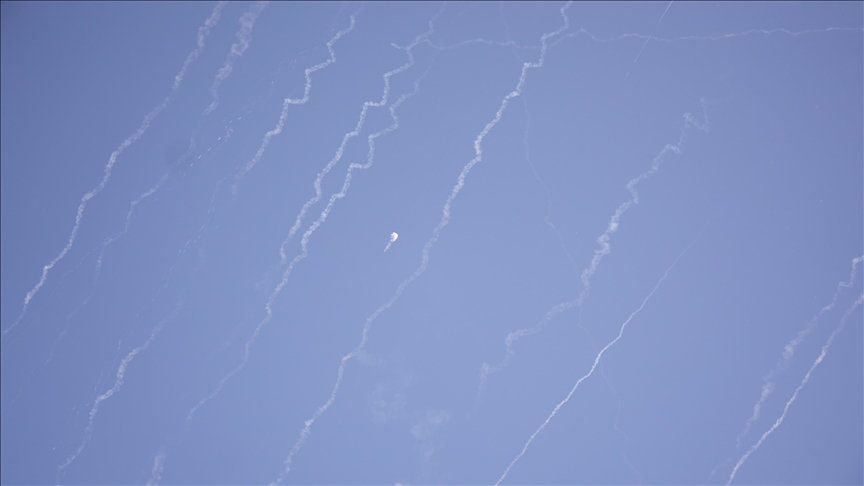European leaders urge de-escalation, diplomacy after US strikes on Iranian nuclear sites
Leaders across Europe call for restraint, warn against escalation, and stress that Iran must never acquire nuclear weapons

ISTANBUL
European leaders on Sunday issued coordinated calls for restraint and a return to diplomacy after US airstrikes targeted three Iranian nuclear facilities, sparking fears of a wider regional conflict.
The strikes, carried out in response to Iran’s advancing nuclear program, prompted an outpouring of concern across Europe, with officials warning against further escalation and stressing that Iran must not be allowed to acquire nuclear weapons.
The US targeted Iran’s nuclear sites with six bunker-buster bombs dropped on the Fordo facility with B-2 stealth bombers, along with dozens of submarine-launched cruise missile strikes on the Natanz and Isfahan facilities.
EU, UK, Germany call for immediate talks
EU foreign policy chief Kaja Kallas urged “all sides to step back, return to the negotiating table, and prevent further escalation.”
Writing on X, she emphasized: “Iran must not be allowed to acquire a nuclear weapon,” adding that EU foreign ministers will discuss the issue at the July 23 Foreign Affairs Council meeting.
European Commission President Ursula von der Leyen echoed that message, calling for a “credible diplomatic solution.”
“The negotiating table is the only place to end this crisis,” she wrote. “Iran must never acquire the bomb. Stability in the Middle East must be the priority.”
In London, British Prime Minister Keir Starmer described Iran’s nuclear program as “a grave threat to international security,” adding that “Iran can never be allowed to develop a nuclear weapon.”
While stressing that the UK was not involved in the US attacks, Starmer told Sky News that the UK is “doing everything we can to stabilize the situation, de-escalate, and get to a negotiated outcome.”
France, Germany reaffirm opposition to nuclear escalation
French Foreign Minister Jean-Noel Barrot said France viewed the strikes “with concern” and reaffirmed Paris’ opposition to Iran acquiring nuclear weapons.
“All parties must exercise restraint,” he said, noting that France did not take part in the planning or execution of the attacks.
France remains committed to a negotiated solution within the Nuclear Non-Proliferation Treaty (NPT) framework, Barrot added.
President Emmanuel Macron also held phone calls with Saudi Crown Prince Mohammed bin Salman and Oman’s Sultan Haitham bin Tariq, the Elysee Palace said.
In Berlin, Chancellor Friedrich Merz convened an urgent Security Cabinet meeting.
Government spokesman Stefan Kornelius said Germany is in close coordination with EU and US allies.
“Chancellor Merz reiterates his call for Iran to immediately begin negotiations with the US and Israel and to reach a diplomatic solution to the conflict,” he said.
Spain, Italy, Norway, Slovenia, Hungary, Albania, and North Macedonia warn against further violence.
Spanish Foreign Minister Jose Manuel Albares said: “There is no military solution that will bring peace and stability,” and urged “all parties to de-escalate.”
Italy’s Prime Minister Giorgia Meloni held emergency consultations, saying Italy is monitoring the crisis’ security and economic implications.
Norwegian Foreign Minister Espen Barth Eide warned the US is “now taking direct part in a war that began when Israel attacked Iran,” urging full compliance with international law.
Slovenian Prime Minister Robert Golob called for an immediate end to hostilities.
“Further escalation of the situation in the Middle East poses a serious threat to the already terrible situation in the region and to international peace,” he said.
Stressing the humanitarian toll, he backed the UN General Assembly’s call, adding: “The only way is peace and diplomacy."
Hungarian Foreign Minister Peter Szijjarto expressed deep concern over the airstrikes and urged all sides to avoid a new war in the region.
“This conflict must not spiral into a global confrontation,” he said.
Szijjarto reiterated Hungary’s position that Iran must never acquire nuclear weapons but emphasized: “Diplomacy, not bombs, is the only solution.”
Albanian Prime Minister Edi Rama also warned against escalation and stressed the need to avoid nuclear proliferation.
“Iran’s nuclear ambitions are a global concern. Albania stands with its partners in urging restraint and a return to negotiations,” Rama said, adding that diplomatic engagement is the “only responsible path forward.”
North Macedonia’s Foreign Minister Timco Mucunski said the latest developments underscore the urgent need for a diplomatic breakthrough.
“The Middle East cannot afford another prolonged conflict,” he warned. “We call for immediate de-escalation and a responsible approach from all sides to ensure peace and protect civilian lives.”
Sweden, Portugal, Netherlands, Romania echo nuclear concerns
Sweden said Iran must not develop nuclear weapons and emphasized that “restraint and a return to diplomacy are of utmost importance.”
Portuguese Prime Minister Luis Montenegro called Iran’s nuclear program a “serious threat to international security.”
Dutch Prime Minister Dick Schoof said: “Negotiations are the only way to a sustainable solution.”
Romania’s Foreign Ministry said US actions “seek to eliminate a grave threat to world peace,” and Bucharest stands ready to support diplomacy.
Bulgaria, Ireland, Vatican join calls for diplomacy
Bulgaria warned of “growing tensions,” while Ireland’s Prime Minister Micheal Martin urged Iran to “unequivocally disavow” nuclear arms development.
Pope Leo XIV called for an end to violence: “Stop the tragedy of war before it becomes an irreparable chasm.”
Tensions escalated after US President Donald Trump confirmed American forces conducted “very successful” strikes on the Fordo, Natanz, and Isfahan sites.
Iran has requested an emergency UN Security Council meeting and accused the US of violating international law.
Hostilities erupted June 13 when Israel bombed Iranian military and nuclear targets, prompting Tehran to respond with missile strikes.
Israeli officials say 25 people have been killed and hundreds injured, while Iran reports 430 deaths and over 3,500 wounded, according to its Health Ministry.
Anadolu Agency website contains only a portion of the news stories offered to subscribers in the AA News Broadcasting System (HAS), and in summarized form. Please contact us for subscription options.







